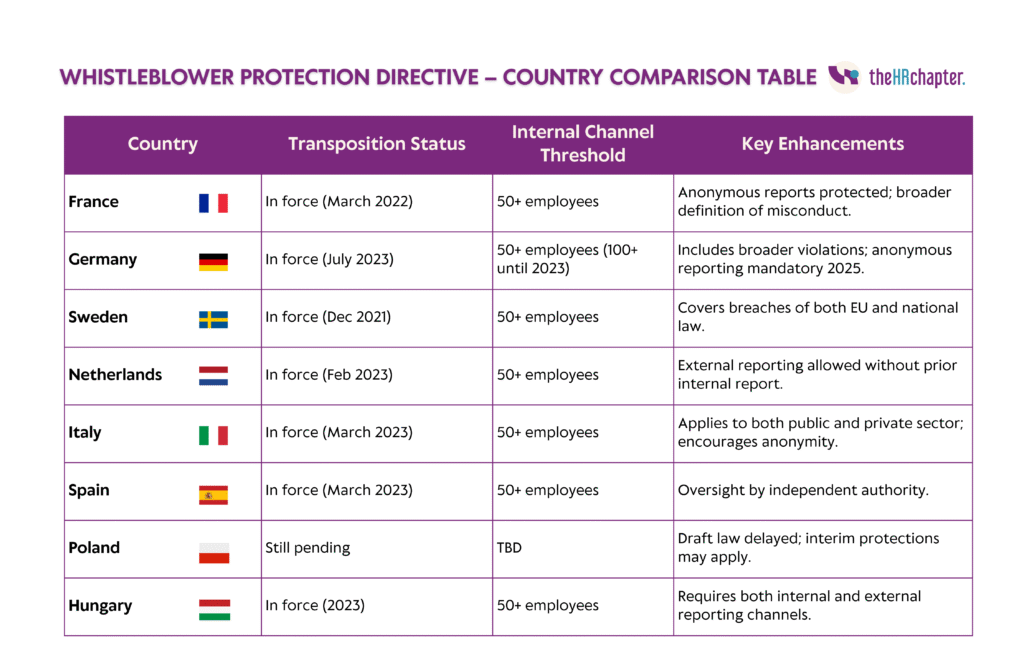Whistleblower Protection Laws in the EU: What HR Needs to Implement Now
In recent years, the European Union has taken decisive steps to strengthen the protection of individuals who report misconduct in the workplace. The EU Whistleblower Protection Directive (Directive (EU) 2019/1937) requires both public and private sector organizations to implement clear, secure, and confidential reporting mechanisms that protect whistleblowers from retaliation.
For HR professionals, this shift represents more than a legal compliance challenge: it signals a cultural evolution. Whistleblower protection is now a core pillar of organizational integrity, not just a policy requirement. Employees are more aware of their rights, and the consequences of mishandling reports (from lawsuits to reputational damage) are more significant than ever.
With most EU member states having transposed the directive into national law, and new 2024–2025 enforcement actions and reforms now in effect, HR departments must take immediate and informed action. This means reviewing policies, upgrading reporting systems, training personnel, and reinforcing a culture where speaking up is both encouraged and safe.
In this article, TheHRchapter outlines the directive’s requirements, who it protects, and what HR must implement now, especially in light of recent changes.
Understanding the EU Whistleblower Protection Directive
Adopted in October 2019, the EU Whistleblower Protection Directive provides uniform minimum standards for protecting individuals who report breaches of EU law in a professional context. Its aim is to ensure that whistleblowers are not punished for speaking up about misconduct and that organizations across the EU create safe, accessible, and reliable channels for reporting.
a. What the directive covers
It applies to a wide range of violations, including:
- Public procurement
- Financial services, money laundering, and tax evasion
- Environmental and consumer protection
- Product and transport safety
- Data protection and public health
The protection extends to:
- Employees (past and present)
- Freelancers and contractors
- Suppliers and consultants
- Interns, volunteers, and even job applicants
b. Key objectives
- Prevent retaliation: Dismissal, demotion, and intimidation are prohibited. Employers must prove disciplinary actions are unrelated to whistleblowing.
- Mandate secure reporting channels: Organizations with 50+ employees must establish systems that allow for confidential or anonymous reports.
- Ensure transparency: Organizations must provide written procedures and adhere to specific timelines for acknowledging and addressing reports.
- Promote internal resolution: While internal reporting is preferred, whistleblowers are still protected when reporting externally or publicly under certain conditions.
- Timeline and implementation
While the directive entered into force in December 2019, EU member states were required to transpose it into national law by 17 December 2021. As of mid-2025, several key developments are shaping enforcement and expectations:
– EU Commission Review (2024). A July 2024 EU Commission report identified inconsistencies in how member states implemented the directive, noting: Gaps in retaliation protections, weak internal procedures and lack of accessible reporting channels.
– Court-Enforced Penalties (2025). In March 2025, the EU Court fined five countries, including Germany (€34M) and Hungary, for delayed or inadequate implementation. This marked a major signal that non-compliance now has real financial consequences.

Reporting channels: What companies must establish
a. Internal reporting procedures: required for 50+ employees
Organizations must ensure that reporting systems are:
- Secure: Protect the identity of whistleblowers and subjects of reports.
- Confidential: Information must not be disclosed without explicit consent.
- Accessible: Clear, simple, and available to all protected individuals.
- Multichannel: Reports can be submitted via email, web portals, hotlines, or in person.
Important: As of 2025, some countries (e.g., Germany) require systems to accept anonymous reports and facilitate two-way anonymous communication.
b. Designated reporting officers or teams
Companies must appoint individuals or teams who are:
- Competent and impartial
- Trained to receive and acknowledge reports within 7 days
- Responsible for confidential investigations
- Able to provide updates and final outcomes
In practice, these roles may be assigned to HR or compliance managers, legal or ethics departments or external whistleblowing service providers (common among SMEs).
c. Timelines for response and follow-up
The directive requires:
- Acknowledgment within 7 days
- Feedback on the investigation within 3 months (extendable to 6 months with justification)
- Final outcomes where appropriate, without breaching confidentiality
Failure to meet these deadlines may lead whistleblowers to bypass internal channels and in some jurisdictions, may expose the company to liability or investigation.
What HR needs to do now
With enforcement ramping up and several EU member states updating their whistleblower laws as recently as 2024–2025, HR departments are no longer passive observers in compliance, they are frontline enablers of legal and ethical integrity. Here’s what HR professionals should prioritize now to ensure full readiness and resilience:
1. Review and Update Internal Policies
Conduct a thorough audit of all HR, ethics, and compliance policies to ensure they reflect both the EU Directive and your national law:
● Ensure the whistleblower definition includes all covered individuals: employees, contractors, job applicants, interns, former workers, and third parties.
● Clarify the types of reportable misconduct, especially if national laws expand beyond EU law (e.g., Germany’s inclusion of administrative offenses).
● Include specific language around confidentiality, protection against retaliation, and support for anonymous reporting.
👉 Pro Tip: Cross-reference your employee handbook, code of conduct, and internal disciplinary procedures to avoid inconsistencies.
2. Upgrade Reporting Channels
The legal minimum is no longer enough. Ensure your reporting infrastructure is:
● Confidential and secure (including digital encryption and access controls).
● Multi-channel, offering at least written (email or web form), oral (hotline), and optionally in-person options.
● Available to external stakeholders where required (e.g., suppliers, freelancers).
● Anonymous-ready in countries where this is mandated or encouraged.
● Multilingual if your workforce spans multiple countries or languages.
👉 Consider using certified third-party platforms for whistleblowing to ensure neutrality, particularly for SMEs.
3. Appoint and Train Reporting Officers
Assign one or more impartial individuals or teams responsible for handling whistleblower reports, and ensure they are:
● Legally literate, with a clear understanding of EU and national requirements.
● Trained in confidentiality, evidence handling, and impartial investigation.
● Conflict-free, they should not be in roles where they may be investigating their own team or management line.
Training should be ongoing and scenario-based, with periodic refreshers and updates when laws change.
👉 In complex or high-risk industries, appoint a cross-functional ethics committee including HR, Legal, and Compliance.
4. Communicate Proactively and Transparently
Reporting channels only work when employees know they exist and trust them. HR must:
● Make policies and reporting steps easily visible on intranet, onboarding portals, and in physical spaces.
● Include whistleblower protections in training, leadership messaging, and employee Q&As.
● Emphasize a zero-tolerance stance on retaliation in every communication.
● Regularly remind staff (via newsletters or email campaigns) of their rights and the support available.
👉 Tip: Create an internal “Speak Up Culture” campaign with visuals, testimonials, and management buy-in.
5. Monitor Legal Changes Across Jurisdictions
As of 2025, several countries (including Germany, France, and Poland) — have introduced new amendments, delayed enforcement, or broadened their scope. HR must stay agile by:
● Appointing a compliance liaison or legal advisor to track changes in real-time.
● Joining industry groups or forums that provide updates and benchmarking tools.
● Updating policies and procedures immediately when national laws change, especially those affecting reporting thresholds, timelines, or anonymity rules.
👉 Use a compliance calendar or shared dashboard to monitor updates in each country where your company operates.
From Compliance to Culture: HR’s Role in Protecting Whistleblowers
Whistleblower protection is no longer just a box to tick, it’s a pillar of organizational trust and ethical resilience. HR has a critical role to play in building systems that not only comply with the law but also empower employees to speak up without fear.
Ready to assess your compliance readiness or implement a whistleblower protection program that actually works? Partner with TheHRchapter, our team of EU compliance experts, HR strategists, and legal advisors can help you.
Let’s build a safer, more transparent workplace together. Contact us to get started.
Need help with other HR services for your business?
At TheHRchapter, we provide tailored solutions to guide startups and scaleups in choosing and implementing the best tools for hiring, onboarding, payroll, employee management and more.
Core HR Services
- HR Consulting: Provides expert advice on various HR matters, including policies, procedures, and compliance
- HR Services for Startups: Offers tailored solutions for startups, helping them establish a strong HR foundation.
- Payroll Services: Manages payroll processing, tax filings, and employee benefits.
Let us help you streamline your HR processes and achieve your business goals. Contact us today to get started!
Spread the Word!
Enjoyed what you’ve read? Help others discover it too! 📢 Share this article and let’s keep the discussion going.
Related Reads: Check out these other Articles!
Expanding to Europe? Why Hiring Is Where Scale Usually Breaks (and How to Fix It Early)
Expanding to Europe? Why Hiring Is Where Scale Usually Breaks (and How to Fix It…
Agentic AI and HR Ethics: Best practices and ensuring compliance for employees and candidates
Agentic AI and HR Ethics: Best practices and ensuring compliance for employees and candidates There’s…
2025: The Year HR Became Strategic – Key Lessons and Insights for HR Leaders
2025: The Year HR Became Strategic – Key Lessons and Insights for HR Leaders 2025…



